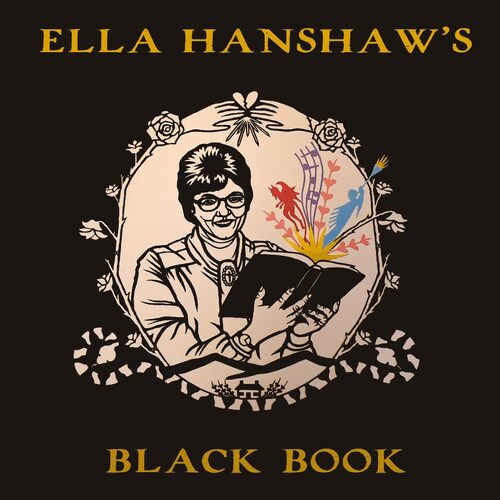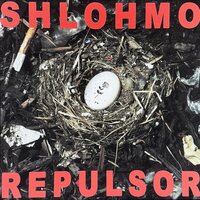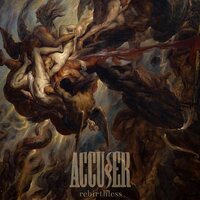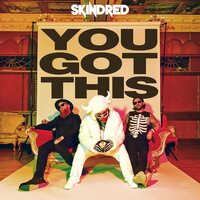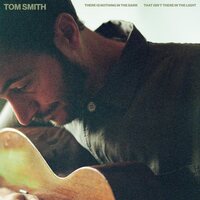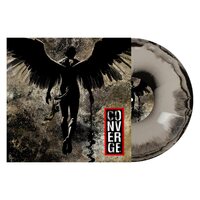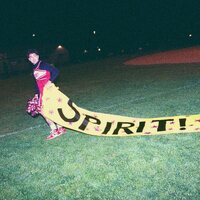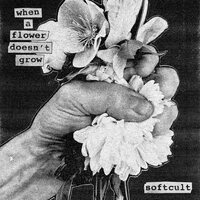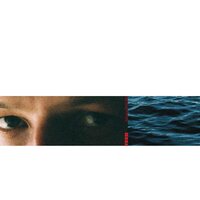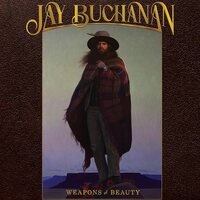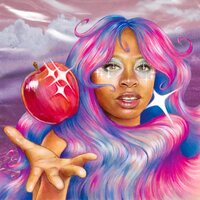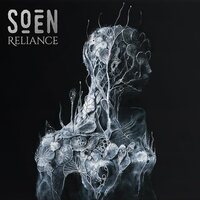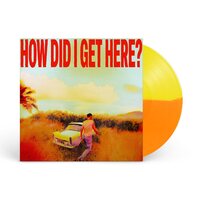When Ella Hanshaw (1934-2020) first picked up the guitar as a twelve-year-old girl in Procious, West Virginia, she dreamed of being a country star. Taking to the instrument easily and learning by ear, she played and sang at home with her parents on the family farm, and was once offered a chance to play on the Midwestern Hayride, the country music radio show broadcast out of Cincinnati. Over the next 74 years of her life, though, as she wrote hundreds of songs, Ella’s artistic goals slowly ascended to a higher realm. By the late 1970s, her music had become inseparable from her faith. She considered her work to be authored by God, who would “give” her a song—both lyrics and melody—which she could write down and complete in fifteen minutes. Despite her warm and easy voice, catchy melodies, prodigious output, and the tours she made across West Virginia with her quartet in the 1980s, Ella’s music was never recorded professionally or released publicly until now.
Ella Hanshaw's Black Book, lovingly compiled by her granddaughter from home and church tape recordings, features a selection of Ella's original gospel songs (Side A: Big Black Book), performed solo and with the Hallelujah Hill Quartet, and her broken-hearted country songs (Side B: Little Black Book) recorded in a back bedroom during quiet moments at home. On some of the unedited recordings, her children can be heard playing in the other room.
In 1983, Ella formed the Hallelujah Hill Quartet, in celebration of the opening of Trinity Missionary Baptist Church, in Clay County, West Virginia. A founding member of the church, she considered the group an outreach tool for spreading the gospel. Along with her husband Tracy, her dear friend Maxine Spencer, and Maxine’s husband, Chester Spencer, the group toured for eight years, singing in churches across the state. Ella wrote all their original songs, sang lead in all but a few (“Is That the Only Time You Call Out His Name” features Maxine on lead), and played the acoustic accompaniment. It was the first and only formal band she ever played in. The majority of the tracks on Side A feature the quartet.
Sometimes for Ella, the act of songwriting merged with the act of divine healing. Sick and struggling, she’d pray and work through a song. Once she completed it, the illness was conquered and she’d be healed. The first track on this album, “One More Hill,” was composed in this way, as she suffered from ruptured and fused discs in her spine. “I hate to see you so sick,” her husband Tracy once told her. “But you always do come out of it with the prettiest songs.” “My Soul Is Free” is a rare recorded duet between Ella and Tracy. Though they often sang together at home, only two of their duet recordings have been found. Tracy had a lovely singing voice, though after decades working in a steel mill, his hearing was shot. For this, he frequently struggled to harmonize, especially in new songs Ella had written.
On June 3, 1991, Ella had her first vision. She also spoke in tongues, a phenomenon described in the Bible as setting the faithful afire. If she had been smoldering with God’s influence before, now she felt fully aflame. She tried her best to explain it to the members of her church, and to her husband. Her transformative experience was considered blasphemous in the Baptist tradition; eventually she left the church she helped build and became a Pentecostal. Her visions, which she recorded in more than one hundred notebooks, continued for the rest of her life. They reveal dark, astonishing scenes in which she took down enemies in epic battles. The lyrics of “Behold and Believe,” which draw from Bible verse Luke 10:19 and feature serpents and scorpions, are an atypical example of her dark and dramatic spiritual life seeping through her usually joyful tone.
Though Ella is a unique talent with a singular voice, her songwriting and self-documentation can be understood as part of a tradition of non-professional women’s songwriting in Appalachia. Writing—such as recording family stories, inscribing birth and death dates in a Bible, maintaining correspondence, or annotating cookbook recipes—was historically one of the few admissible creative outlets for women in the mountain South. Though this practice ensured family knowledge was passed on to the next generation, women used this outlet in subversive ways to develop a voice and identity outside the limitations of prescribed gender roles. By writing gospel music, performing in church, and viewing her artistic talent and inspiration as gifts from God, Ella framed her work in such a way that she could still claim artistic agency while avoiding individual attention that may have been perceived as self-indulgent and socially unacceptable. Resistant to the potential consequences of a professional music career as a woman and mother, Ella chose to keep her music a non-professional pursuit, shared with family, community, and God, which allowed her to uphold the duty she felt to all three.
The earliest songs Ella wrote, secular songs, follow the country genre closely as she learned the basics of songcraft. In those years before she devoted her music to her spiritual life, Ella listened closely to artists like George Jones, Merle Haggard, Jeanne Pruett, and Wanda Jackson. Songs like “Little Black Book” and “Think It Over,” with their cleverly articulated despair and earworm melodies, could easily fit within the broken-hearted country gal repertoire of the likes of Kitty Wells and Loretta Lynn, whose music Ella admired. Though Ella was later ambivalent about her secular songs—she asked specifically that they be kept separate from her gospel songs, which she considered her true legacy—they are the seed of her musical development. For this, they are included on the record on a separate side. And though they may at first seem a far cry from the fervent spirituals of Ella’s later work, her song “Reaching For Heaven/Reaching For You” clearly bridges the chasm between the sacred and the secular, clueing the listener into a larger continuity.
Despite changing style and intent, themes remain the same across Ella’s sacred and secular songs: love and longing for what we cannot quite touch—not yet, anyway—and the physical pages of possibility that we can hold in the meantime. The Big Black Book and Little Black Book are guides left to us by a woman who smoldered steadily for decades until, one day in 1991, she woke up in flames—and from there confidently blazed her way into paradise.
- 1. One More Hill*
- 2. The Devil Gets Me Down and The Lord Picks Me Up*
- 3. Is That the Only Time You Call Out His Name*
- 4. When The Time Is Right (CD & digital release only)
- 5. Open Season on The Devil
- 6. Behold and Believe
- 7. My Soul Is Free
- 8. Beauty Beyond the Rainbow*
- 9. Will My Lord Be Proud*
- 10. Little Black Book
- 11. Think It Over
- 12. Nobody's Fool
- 13. Back In Your Heart
- 14. How You Gonna Love Me?
- 15. Mr. B's
- 16. Reaching for Heaven/Reaching for You
- 17. I'll Cry Tomorrow
